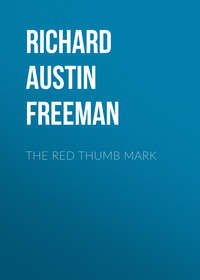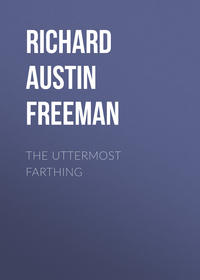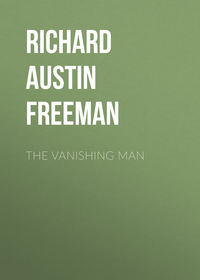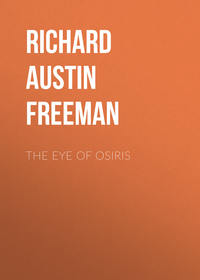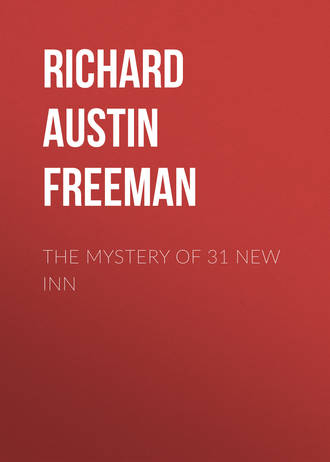 полная версия
полная версияThe Mystery of 31 New Inn
Turning this question over, I suddenly remembered the peculiarity of Mr. Weiss's spectacles. And here I met with a real poser. I had certainly seen through those spectacles as clearly as if they had been plain window-glass; and they had certainly given an inverted reflection of the candle-flame like that thrown from the surface of a concave lens. Now they obviously could not be both flat and concave; but yet they had the properties peculiar to both flatness and concavity. And there was a further difficulty. If I could see objects unaltered through them, so could Mr. Weiss. But the function of spectacles is to alter the appearances of objects, by magnification, reduction or compensating distortion. If they leave the appearances unchanged they are useless. I could make nothing of it. After puzzling over it for quite a long time, I had to give it up; which I did the less unwillingly inasmuch as the construction of Mr. Weiss's spectacles had no apparent bearing on the case.
On arriving home, I looked anxiously at the message-book, and was relieved to find that there were no further visits to be made. Having made up a mixture for Mr. Graves and handed it to the coachman, I raked the ashes of the surgery fire together and sat down to smoke a final pipe while I reflected once more on the singular and suspicious case in which I had become involved. But fatigue soon put an end to my meditations; and having come to the conclusion that the circumstances demanded a further consultation with Thorndyke, I turned down the gas to a microscopic blue spark and betook myself to bed.
Chapter IV
The Official ViewI rose on the following morning still possessed by the determination to make some oportunity during the day to call on Thorndyke and take his advice on the now urgent question as to what I was to do. I use the word "urgent" advisedly; for the incidents of the preceding evening had left me with the firm conviction that poison was being administered for some purpose to my mysterious patient, and that no time must be lost if his life was to be saved. Last night he had escaped only by the narrowest margin—assuming him to be still alive—and it was only my unexpectedly firm attitude that had compelled Mr. Weiss to agree to restorative measures.
That I should be sent for again I had not the slightest expectation. If what I so strongly suspected was true, Weiss would call in some other doctor, in the hope of better luck, and it was imperative that he should be stopped before it was too late. This was my view, but I meant to have Thorndyke's opinion, and act under his direction, but
"The best laid plans of mice and men Gang aft agley."
When I came downstairs and took a preliminary glance at the rough memorandum-book, kept by the bottle-boy, or, in his absence, by the housemaid, I stood aghast. The morning's entries looked already like a sample page of the Post Office directory. The new calls alone were more than equal to an ordinary day's work, and the routine visits remained to be added. Gloomily wondering whether the Black Death had made a sudden reappearance in England, I hurried to the dining-room and made a hasty breakfast, interrupted at intervals by the apparition of the bottle-boy to announce new messages.
The first two or three visits solved the mystery. An epidemic of influenza had descended on the neighbourhood, and I was getting not only our own normal work but a certain amount of overflow from other practices. Further, it appeared that a strike in the building trade had been followed immediately by a widespread failure of health among the bricklayers who were members of a certain benefit club; which accounted for the remarkable suddenness of the outbreak.
Of course, my contemplated visit to Thorndyke was out of the question. I should have to act on my own responsibility. But in the hurry and rush and anxiety of the work—for some of the cases were severe and even critical—I had no opportunity to consider any course of action, nor time to carry it out. Even with the aid of a hansom which I chartered, as Stillbury kept no carriage, I had not finished my last visit until near on midnight, and was then so spent with fatigue that I fell asleep over my postponed supper.
As the next day opened with a further increase of work, I sent a telegram to Dr. Stillbury at Hastings, whither he had gone, like a wise man, to recruit after a slight illness. I asked for authority to engage an assistant, but the reply informed me that Stillbury himself was on his way to town; and to my relief, when I dropped in at the surgery for a cup of tea, I found him rubbing his hands over the open day-book.
"It's an ill wind that blows nobody good," he remarked cheerfully as we shook hands. "This will pay the expenses of my holiday, including you. By the way, you are not anxious to be off, I suppose?"
As a matter of fact, I was; for I had decided to accept Thorndyke's offer, and was now eager to take up my duties with him. But it would have been shabby to leave Stillbury to battle alone with this rush of work or to seek the services of a strange assistant.
"I should like to get off as soon as you can spare me," I replied, "but I'm not going to leave you in the lurch."
"That's a good fellow," said Stillbury. "I knew you wouldn't. Let us have some tea and divide up the work. Anything of interest going?"
There were one or two unusual cases on the list, and, as we marked off our respective patients, I gave him the histories in brief synopsis. And then I opened the subject of my mysterious experiences at the house of Mr. Weiss.
"There's another affair that I want to tell you about; rather an unpleasant business."
"Oh, dear!" exclaimed Stillbury. He put down his cup and regarded me with quite painful anxiety.
"It looks to me like an undoubted case of criminal poisoning," I continued.
Stillbury's face cleared instantly. "Oh, I'm glad it's nothing more than that," he said with an air of relief. "I was afraid, it was some confounded woman. There's always that danger, you know, when a locum is young and happens—if I may say so, Jervis—to be a good-looking fellow. Let us hear about this case."
I gave him a condensed narrative of my connection with the mysterious patient, omitting any reference to Thorndyke, and passing lightly over my efforts to fix the position of the house, and wound up with the remark that the facts ought certainly to be communicated to the police.
"Yes," he admitted reluctantly, "I suppose you're right. Deuced unpleasant though. Police cases don't do a practice any good. They waste a lot of time, too; keep you hanging about to give evidence. Still, you are quite right. We can't stand by and see the poor devil poisoned without making some effort. But I don't believe the police will do anything in the matter."
"Don't you really?"
"No, I don't. They like to have things pretty well cut and dried before they act. A prosecution is an expensive affair, so they don't care to prosecute unless they are fairly sure of a conviction. If they fail they get hauled over the coals."
"But don't you think they would get a conviction in this case?"
"Not on your evidence, Jervis. They might pick up something fresh, but, if they didn't they would fail. You haven't got enough hard-baked facts to upset a capable defence. Still, that isn't our affair. You want to put the responsibility on the police and I entirely agree with you."
"There ought not to be any delay," said I.
"There needn't be. I shall look in on Mrs. Wackford and you have to see the Rummel children; we shall pass the station on our way. Why shouldn't we drop in and see the inspector or superintendent?"
The suggestion met my views exactly. As soon as we had finished tea, we set forth, and in about ten minutes found ourselves in the bare and forbidding office attached to the station.
The presiding officer descended from a high stool, and, carefully laying down his pen, shook hands cordially.
"And what can I do for you gentlemen?" he asked, with an affable smile.
Stillbury proceeded to open our business.
"My friend here, Dr. Jervis, who has very kindly been looking after my work for a week or two, has had a most remarkable experience, and he wants to tell you about it."
"Something in my line of business?" the officer inquired.
"That," said I, "is for you to judge. I think it is, but you may think otherwise"; and hereupon, without further preamble, I plunged into the history of the case, giving him a condensed statement similar to that which I had already made to Stillbury.
He listened with close attention, jotting down from time to time a brief note on a sheet of paper; and, when I had finished, he wrote out in a black-covered notebook a short précis of my statement.
"I have written down here," he said, "the substance of what you have told me. I will read the deposition over to you, and, if it is correct, I will ask you to sign it."
He did so, and, when I had signed the document, I asked him what was likely to be done in the matter.
"I am afraid," he replied, "that we can't take any active measures. You have put us on our guard and we shall keep our eyes open. But I think that is all we can do, unless we hear something further."
"But," I exclaimed, "don't you think that it is a very suspicious affair?"
"I do," he replied. "A very fishy business indeed, and you were quite right to come and tell us about it."
"It seems a pity not to take some measures," I said. "While you are waiting to hear something further, they may give the poor wretch a fresh dose and kill him."
"In which case we should hear something further, unless some fool of a doctor were to give a death certificate."
"But that is very unsatisfactory. The man ought not to be allowed to die."
"I quite agree with you, sir. But we've no evidence that he is going to die. His friends sent for you, and you treated him skilfully and left him in a fair way to recovery. That's all that we really know about it. Yes, I know," the officer continued as I made signs of disagreement, "you think that a crime is possibly going to be committed and that we ought to prevent it. But you overrate our powers. We can only act on evidence that a crime has actually been committed or is actually being attempted. Now we have no such evidence. Look at your statement, and tell me what you can swear to."
"I think I could swear that Mr. Graves had taken a poisonous dose of morphine."
"And who gave him that poisonous dose?"
"I very strongly suspect—"
"That's no good, sir," interrupted the officer. "Suspicion isn't evidence. We should want you to swear an information and give us enough facts to make out a primâ facie case against some definite person. And you couldn't do it. Your information amounts to this: that a certain person has taken a poisonous dose of morphine and apparently recovered. That's all. You can't swear that the names given to you are real names, and you can't give us any address or even any locality."
"I took some compass bearings in the carriage," I said. "You could locate the house, I think, without much difficulty."
The officer smiled faintly and fixed an abstracted gaze on the clock.
"You could, sir," he replied. "I have no doubt whatever that you could. I couldn't. But, in any case, we haven't enough to go upon. If you learn anything fresh, I hope you will let me know; and I am very much obliged to you for taking so much trouble in the matter. Good evening sir. Good evening, Dr. Stillbury."
He shook hands with us both genially, and, accepting perforce this very polite but unmistakable dismissal, we took our departure.
Outside the station, Stillbury heaved a comfortable sigh. He was evidently relieved to find that no upheavals were to take place in his domain.
"I thought that would be their attitude," he said, "and they are quite right, you know. The function of law is to prevent crime, it is true; but prophylaxis in the sense in which we understand it is not possible in legal practice."
I assented without enthusiasm. It was disappointing to find that no precautionary measures were to be taken. However, I had done all that I could in the matter. No further responsibility lay upon me, and, as it was practically certain that I had seen and heard the last of Mr. Graves and his mysterious household, I dismissed the case from my mind. At the next corner Stillbury and I parted to go our respective ways; and my attention was soon transferred from the romance of crime to the realities of epidemic influenza.
The plethora of work in Dr. Stillbury's practice continued longer than I had bargained for. Day after day went by and still found me tramping the dingy streets of Kennington or scrambling up and down narrow stairways; turning in at night dead tired, or turning out half awake to the hideous jangle of the night bell.
It was very provoking. For months I had resisted Thorndyke's persuasion to give up general practice and join him. Not from lack of inclination, but from a deep suspicion that he was thinking of my wants rather than his own; that his was a charitable rather than a business proposal. Now that I knew this not to be the case, I was impatient to join him; and, as I trudged through the dreary thoroughfares of this superannuated suburb, with its once rustic villas and its faded gardens, my thoughts would turn enviously to the quiet dignity of the Temple and my friend's chambers in King's Bench Walk.
The closed carriage appeared no more; nor did any whisper either of good or evil reach me in connection with the mysterious house from which it had come. Mr. Graves had apparently gone out of my life for ever.
But if he had gone out of my life, he had not gone out of my memory. Often, as I walked my rounds, would the picture of that dimly-lit room rise unbidden. Often would I find myself looking once more into that ghastly face, so worn, so wasted and haggard, and yet so far from repellent. All the incidents of that last night would reconstitute themselves with a vividness that showed the intensity of the impression that they had made at the time. I would have gladly forgotten the whole affair, for every incident of it was fraught with discomfort. But it clung to my memory; it haunted me; and ever as it returned it bore with it the disquieting questions: Was Mr. Graves still alive? And, if he was not, was there really nothing which could have been done to save him?
Nearly a month passed before the practice began to show signs of returning to its normal condition. Then the daily lists became more and more contracted and the day's work proportionately shorter. And thus the term of my servitude came to an end. One evening, as we were writing up the day-book, Stillbury remarked:
"I almost think, Jervis, I could manage by myself now. I know you are only staying on for my sake."
"I am staying on to finish my engagement, but I shan't be sorry to clear out if you can do without me."
"I think I can. When would you like to be off?"
"As soon as possible. Say to-morrow morning, after I have made a few visits and transferred the patients to you."
"Very well," said Stillbury. "Then I will give you your cheque and settle up everything to-night, so that you shall be free to go off when you like to-morrow morning."
Thus ended my connection with Kennington Lane. On the following day at about noon, I found myself strolling across Waterloo Bridge with the sensations of a newly liberated convict and a cheque for twenty-five guineas in my pocket. My luggage was to follow when I sent for it. Now, unhampered even by a hand-bag, I joyfully descended the steps at the north end of the bridge and headed for King's Bench Walk by way of the Embankment and Middle Temple Lane.
Chapter V
Jeffrey Blackmore's WillMy arrival at Thorndyke's chambers was not unexpected, having been heralded by a premonitory post-card. The "oak" was open and an application of the little brass knocker of the inner door immediately produced my colleague himself and a very hearty welcome.
"At last," said Thorndyke, "you have come forth from the house of bondage. I began to think that you had taken up your abode in Kennington for good."
"I was beginning, myself, to wonder when I should escape. But here I am; and I may say at once that I am ready to shake the dust of general practice off my feet for ever—that is, if you are still willing to have me as your assistant."
"Willing!" exclaimed Thorndyke, "Barkis himself was not more willing than I. You will be invaluable to me. Let us settle the terms of our comradeship forthwith, and to-morrow we will take measures to enter you as a student of the Inner Temple. Shall we have our talk in the open air and the spring sunshine?"
I agreed readily to this proposal, for it was a bright, sunny day and warm for the time of year—the beginning of April. We descended to the Walk and thence slowly made our way to the quiet court behind the church, where poor old Oliver Goldsmith lies, as he would surely have wished to lie, in the midst of all that had been dear to him in his chequered life. I need not record the matter of our conversation. To Thorndyke's proposals I had no objections to offer but my own unworthiness and his excessive liberality. A few minutes saw our covenants fully agreed upon, and when Thorndyke had noted the points on a slip of paper, signed and dated it and handed it to me, the business was at an end.
"There," my colleague said with a smile as he put away his pocket-book, "if people would only settle their affairs in that way, a good part of the occupation of lawyers would be gone. Brevity is the soul of wit; and the fear of simplicity is the beginning of litigation."
"And now," I said, "I propose that we go and feed. I will invite you to lunch to celebrate our contract."
"My learned junior is premature," he replied. "I had already arranged a little festivity—or rather had modified one that was already arranged. You remember Mr. Marchmont, the solicitor?"
"Yes."
"He called this morning to ask me to lunch with him and a new client at the 'Cheshire Cheese.' I accepted and notified him that I should bring you."
"Why the 'Cheshire Cheese'?" I asked.
"Why not? Marchmont's reasons for the selection were, first, that his client has never seen an old-fashioned London tavern, and second, that this is Wednesday and he, Marchmont, has a gluttonous affection for a really fine beef-steak pudding. You don't object, I hope?"
"Oh, not at all. In fact, now that you mention it, my own sensations incline me to sympathize with Marchmont. I breakfasted rather early."
"Then come," said Thorndyke. "The assignation is for one o'clock, and, if we walk slowly, we shall just hit it off."
We sauntered up Inner Temple Lane, and, crossing Fleet Street, headed sedately for the tavern. As we entered the quaint old-world dining-room, Thorndyke looked round and a gentleman, who was seated with a companion at a table in one of the little boxes or compartments, rose and saluted us.
"Let me introduce you to my friend Mr. Stephen Blackmore," he said as we approached. Then, turning to his companion, he introduced us by our respective names.
"I engaged this box," he continued, "so that we might be private if we wished to have a little preliminary chat; not that beef-steak pudding is a great help to conversation. But when people have a certain business in view, their talk is sure to drift towards it, sooner or later."
Thorndyke and I sat down opposite the lawyer and his client, and we mutually inspected one another. Marchmont I already knew; an elderly, professional-looking man, a typical solicitor of the old school; fresh-faced, precise, rather irascible, and conveying a not unpleasant impression of taking a reasonable interest in his diet. The other man was quite young, not more than five-and-twenty, and was a fine athletic-looking fellow with a healthy, out-of-door complexion and an intelligent and highly prepossessing face. I took a liking to him at the first glance, and so, I saw, did Thorndyke.
"You two gentlemen," said Blackmore, addressing us, "seem to be quite old acquaintances. I have heard so much about you from my friend, Reuben Hornby."
"Ah!" exclaimed Marchmont, "that was a queer case—'The Case of the Red Thumb Mark,' as the papers called it. It was an eye-opener to old-fashioned lawyers like myself. We've had scientific witnesses before—and bullied 'em properly, by Jove! when they wouldn't give the evidence that we wanted. But the scientific lawyer is something new. His appearance in court made us all sit up, I can assure you."
"I hope we shall make you sit up again," said Thorndyke.
"You won't this time," said Marchmont. "The issues in this case of my friend Blackmore's are purely legal; or rather, there are no issues at all. There is nothing in dispute. I tried to prevent Blackmore from consulting you, but he wouldn't listen to reason. Here! Waiter! How much longer are we to be waiters? We shall die of old age before we get our victuals!"
The waiter smiled apologetically. "Yessir!" said he. "Coming now, sir." And at this very moment there was borne into the room a Gargantuan pudding in a great bucket of a basin, which being placed on a three-legged stool was forthwith attacked ferociously by the white-clothed, white-capped carver. We watched the process—as did every one present—with an interest not entirely gluttonous, for it added a pleasant touch to the picturesque old room, with its sanded floor, its homely, pew-like boxes, its high-backed settles and the friendly portrait of the "great lexicographer" that beamed down on us from the wall.
"This is a very different affair from your great, glittering modern restaurant," Mr. Marchmont remarked.
"It is indeed," said Blackmore, "and if this is the way in which our ancestors lived, it would seem that they had a better idea of comfort than we have."
There was a short pause, during which Mr. Marchmont glared hungrily at the pudding; then Thorndyke said:
"So you refused to listen to reason, Mr. Blackmore?"
"Yes. You see, Mr. Marchmont and his partner had gone into the matter and decided that there was nothing to be done. Then I happened to mention the affair to Reuben Hornby, and he urged me to ask your advice on the case."
"Like his impudence," growled Marchmont, "to meddle with my client."
"On which," continued Blackmore, "I spoke to Mr. Marchmont and he agreed that it was worth while to take your opinion on the case, though he warned me to cherish no hopes, as the affair was not really within your specialty."
"So you understand," said Marchmont, "that we expect nothing. This is quite a forlorn hope. We are taking your opinion as a mere formality, to be able to say that we have left nothing untried."
"That is an encouraging start," Thorndyke remarked. "It leaves me unembarrassed by the possibility of failure. But meanwhile you are arousing in me a devouring curiosity as to the nature of the case. Is it highly confidential? Because if not, I would mention that Jervis has now joined me as my permanent colleague."
"It isn't confidential at all," said Marchmont. "The public are in full possession of the facts, and we should be only too happy to put them in still fuller possession, through the medium of the Probate Court, if we could find a reasonable pretext. But we can't."
Here the waiter charged our table with the fussy rapidity of the overdue.
"Sorry to keep you waiting, sir. Rather early, sir. Wouldn't like it underdone, sir."
Marchmont inspected his plate critically and remarked:
"I sometimes suspect these oysters of being mussels; and I'll swear the larks are sparrows."
"Let us hope so," said Thorndyke. "The lark is better employed 'at Heaven's gate singing' than garnishing a beef-steak pudding. But you were telling us about your case."
"So I was. Well it's just a matter of—ale or claret? Oh, claret, I know. You despise the good old British John Barleycorn."
"He that drinks beer thinks beer," retorted Thorndyke. "But you were saying that it is just a matter of—?"
"A matter of a perverse testator and an ill-drawn will. A peculiarly irritating case, too, because the defective will replaces a perfectly sound one, and the intentions of the testator were—er—were—excellent ale, this. A little heady, perhaps, but sound. Better than your sour French wine, Thorndyke—were—er—were quite obvious. What he evidently desired was—mustard? Better have some mustard. No? Well, well! Even a Frenchman would take mustard. You can have no appreciation of flavour, Thorndyke, if you take your victuals in that crude, unseasoned state. And, talking of flavour, do you suppose that there is really any difference between that of a lark and that of a sparrow?"


